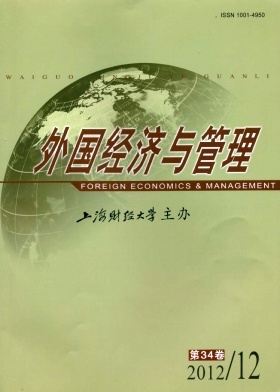团队互动过程模型研究评介与未来展望
外国经济与管理 2012 年 第 34 卷第 12 期, 页码:39 - 48
摘要
参考文献
摘要
工作团队的有效运作是确保企业竞争力的有效法宝,研究团队互动过程,探究团队互动的前因与结果以及各个影响因素之间的作用机理对于发挥团队精神、确保组织成功具有重要的理论及实践意义。本文对较有影响的团队互动过程模型进行了回顾和分析,总结了这些模型的特点、贡献,模型之间的承继关系及对国内团队互动研究的启示,并展望了团队互动过程研究未来进一步深入的方向。
关键词
[1]Basaglia S L,et al.IT knowledge integration capability and team performance:The role of team climate[J].International Journal of Information Management,2010,30(4):542-551.
[2]Campion M,et al.Relations between work group characteris-tics and effectiveness:Implications for designing effective work groups[J].Personnel Psychology,1993,46(8):823-850.
[3]Chen G and Kanfer R.Towards a systems theory of motiva-ted behavior in work teams[J].Research in Organizational Behavior,2006,27(3):223-267.
[4]Cole M S,et al.Linking leader behavior and leadership con-sensus to team performance:Integrating direct consensus and dispersion models of group composition[J].Leadership Quar-terly,2011,22(2):383-398.
[5]Ensley D,et al.Top management team process,shared leader-ship,and new venture performance:A theoretical model and re-search agenda[J].Human Resource Management Review,2003,13(3):329-346.
[6]Gladstein L.Group in context:A model of task group effec-tiveness[J].Administrative Science Quarterly,1984,29(5):499-517.
[7]Hackman J.A normative model of work team effectiveness(Technical Report No.2)[R].Yale School of Organization and Management,New Haven,CT,1983.
[8]Heidemeier H and Moser K.Self-other agreement in job per-formance ratings:A meta-analytic test of a process model[J].Journal of Applied Psychology,2009,94(3):353-370.
[9]Jewell N and Reitz J.Group effectiveness in organizations[M].Illinois:Foresman and Company,1981.
[10]Lee H.Theoretical base for team management of good per-formance:Research review and agenda[J].Review of Admi-nistrative Management,1997,6(4):87-104.
[11]McGrath J.Social psychology:A brief introduction[M].New York:Holt,Rinehart&Winston,1964.
[12]Mohammed S and Ringseis E.Cognitive diversity and con-sensus in group decision making:The role of inputs,proces-ses,and outcomes[J].Organizational Behavior and Human Decision Processes,2001,85(3):310-335.
[13]Morgan B,et al.Measurement of team behaviors in a navy environment[R].Naval Training Systems Center,Florida,1986.
[14]Murayama K and Elliot A J.The joint influence of personal a-chievement goals and classroom goal structures on achievement-re-lated outcomes[J].Journal of Educational Psychology,2009,101(5):432-447.
[15]Nieva F,et al.Team dimension:Their identity,their measurement,and their relationship[R].Washington:Advanced Research Resources Organizations,1978.
[16]Pieterse D,et al.Diversity in goal orientation,team reflexivity,and team performance[J].Organizational Behavior and Human De-cision Processes,2011,114(2):153-164.
[17]Rosen M A,et al.Managing adaptive performance in teams:Guiding principles and behavioral markers for measurement[J].Human Resouce Management Review,2011,21(2):107-122.
[18]Salas J,et al.Toward an understanding of team performance and training[A].Sweaey W and Salas J(Eds.).Teams:Their training and performance[C].NJ:Ablex,1992:3-29.
[19]Schwarz R.The skilled facilitator:Practical wisdom from developing effective groups[M].CA:Jossey-Bass Publishers,1994.
[20]van Ginkel W P and van Knippenberg D.Group information elaboration and group decision making:The role of shared task representations[J].Organizational Behavior and Human Decision Processes,2008,105(1):82—97.
[2]Campion M,et al.Relations between work group characteris-tics and effectiveness:Implications for designing effective work groups[J].Personnel Psychology,1993,46(8):823-850.
[3]Chen G and Kanfer R.Towards a systems theory of motiva-ted behavior in work teams[J].Research in Organizational Behavior,2006,27(3):223-267.
[4]Cole M S,et al.Linking leader behavior and leadership con-sensus to team performance:Integrating direct consensus and dispersion models of group composition[J].Leadership Quar-terly,2011,22(2):383-398.
[5]Ensley D,et al.Top management team process,shared leader-ship,and new venture performance:A theoretical model and re-search agenda[J].Human Resource Management Review,2003,13(3):329-346.
[6]Gladstein L.Group in context:A model of task group effec-tiveness[J].Administrative Science Quarterly,1984,29(5):499-517.
[7]Hackman J.A normative model of work team effectiveness(Technical Report No.2)[R].Yale School of Organization and Management,New Haven,CT,1983.
[8]Heidemeier H and Moser K.Self-other agreement in job per-formance ratings:A meta-analytic test of a process model[J].Journal of Applied Psychology,2009,94(3):353-370.
[9]Jewell N and Reitz J.Group effectiveness in organizations[M].Illinois:Foresman and Company,1981.
[10]Lee H.Theoretical base for team management of good per-formance:Research review and agenda[J].Review of Admi-nistrative Management,1997,6(4):87-104.
[11]McGrath J.Social psychology:A brief introduction[M].New York:Holt,Rinehart&Winston,1964.
[12]Mohammed S and Ringseis E.Cognitive diversity and con-sensus in group decision making:The role of inputs,proces-ses,and outcomes[J].Organizational Behavior and Human Decision Processes,2001,85(3):310-335.
[13]Morgan B,et al.Measurement of team behaviors in a navy environment[R].Naval Training Systems Center,Florida,1986.
[14]Murayama K and Elliot A J.The joint influence of personal a-chievement goals and classroom goal structures on achievement-re-lated outcomes[J].Journal of Educational Psychology,2009,101(5):432-447.
[15]Nieva F,et al.Team dimension:Their identity,their measurement,and their relationship[R].Washington:Advanced Research Resources Organizations,1978.
[16]Pieterse D,et al.Diversity in goal orientation,team reflexivity,and team performance[J].Organizational Behavior and Human De-cision Processes,2011,114(2):153-164.
[17]Rosen M A,et al.Managing adaptive performance in teams:Guiding principles and behavioral markers for measurement[J].Human Resouce Management Review,2011,21(2):107-122.
[18]Salas J,et al.Toward an understanding of team performance and training[A].Sweaey W and Salas J(Eds.).Teams:Their training and performance[C].NJ:Ablex,1992:3-29.
[19]Schwarz R.The skilled facilitator:Practical wisdom from developing effective groups[M].CA:Jossey-Bass Publishers,1994.
[20]van Ginkel W P and van Knippenberg D.Group information elaboration and group decision making:The role of shared task representations[J].Organizational Behavior and Human Decision Processes,2008,105(1):82—97.
引用本文
葛宝山, 刘牧, 董保宝. 团队互动过程模型研究评介与未来展望[J]. 外国经济与管理, 2012, 34(12): 39–48.
导出参考文献,格式为:
下一篇:国外政治技能最新研究进展述评





 7313
7313  684
684

